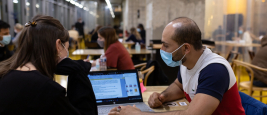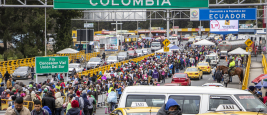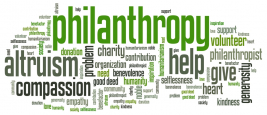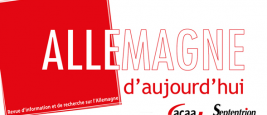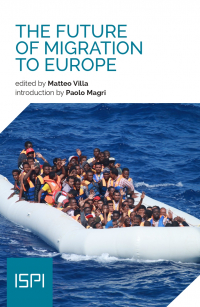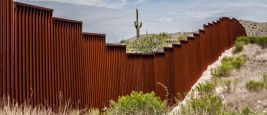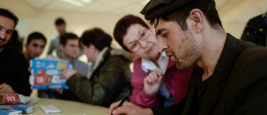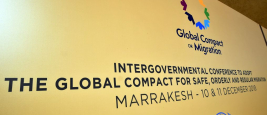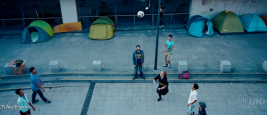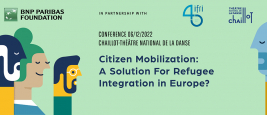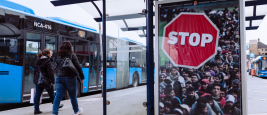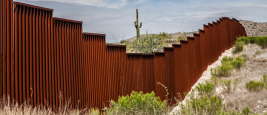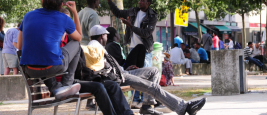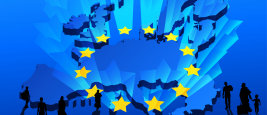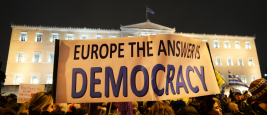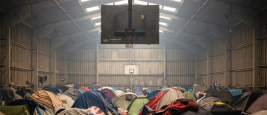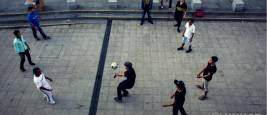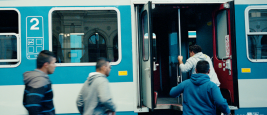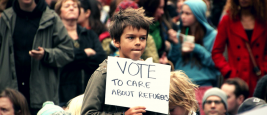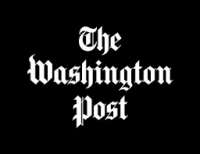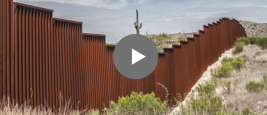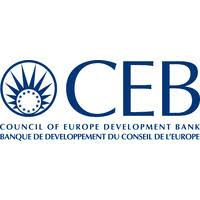The issues of employment and work for refugees have received increasing attention from both the political, NGO and economic spheres in France since 2017, but few studies have yet to address this subject. This study was born out of cooperation between the Observatory on Immigration and Asylum...

Observatory on Immigration and Asylum
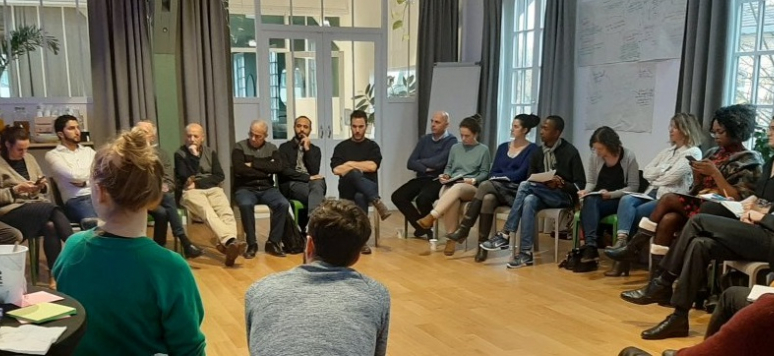
Since 2015, the French asylum and immigration landscapes have been through major changes subsequent to the global mixed migration flows, European immigration and asylum policies, and increased citizen mobilization in the aftermath of the so-called "refugee crisis". In order to analyze theses changes, Ifri created the Observatory on Immigration and Asylum whithin Ifri's Center for Migration and Citizenship in 2018.
The Observatory on Immigration and Asylum is a forum of dialogue and cooperation between state and non-state actors in the fields of reception and integration of migrants and refugees. The Observatory offers a place for exchange, expertise, a laboratory for innovation and building new solutions to address the needs of migrants and refugees. The Observatory’s objective is to initiate synergies of skills and resources notwithstanding each actor policy position and scope of action.
The Observatory brings together migrants, refugees, advocacy NGOs, not-for-profit service providers, groups of volunteers, and not-for-profit “start-ups”. The Observatory supports the promotion and development of initiatives to achieve greater efficiency and sustainability. Relevant ministries, local authorities, corporate and philanthropic foundations are also involved in the Observatory’s activities.
This place of dialogue and expertise offers:
- Studies and reports on the challenges in the fields of reception and integration of migrants and refugees,
- Roundtables and meetings bringing together authorities, NGOs and the private sector to enhance the complementary of activities and capacity building of stakeholders,
- Support for the cooperation of actors and innovation to address the needs of migrants and refugees,
- Public conferences to raise knowledge and awareness on topics related to immigration and asylum,
- Comparative research papers on immigration policies in Europe and Northern America,
Moreover, the Observatory organises working meetings on specific topics, such as the private sponsorship of refugees. It coordinates a network of corporate foundations that come together to support innovation in the fields of reception and integration. The Observatory’s team members can also make contributions to NGOs and higher education institutions. The Observatory on immigration and asylum also works in partnership with Guiti News, an online media offering a Franco-Refugee perspective on immigration and asylum issues.
Read the press release of October 20, 2021: The French Foundations Committee for the Reception and Integration of Refugees and Migrants is launching a pilot language-teaching project in Corrèze (Central France)
Since 2015, South American countries have been dealing with the greatest forced displacement in their history. More than 5.6 million Venezuelans have left their country under great hardships, fleeing deteriorating living conditions, famine, and lack of access to medical treatment and...
The 2015 “crisis” accelerated and/or intensified the involvement of foundations (in particular those from the private sector) in the field of migration. The crisis not only created a sense of urgency, but also generated a movement of public empathy that foundations were willing to accompany...
EU policy on migration and asylum is being built for the last 20 years. But this process is today on hold although France and Germany support the same position on this matter. However, the “migration crisis” in 2015 highlighted the weakness of the Franco-German alliance and the extend to which...
In France, people participating in policies and programs that affect them is not a new concept. It has been widely studied in the field of social work and the fight against poverty, and is at the heart of many experiments. How can this concept of participation, as is outlined for people...
More than 70 million people were forcibly displaced at the end of 2018. In that context, more safe and legal pathways to countries of asylum is a crucial challenge for the international protection regime. A toolkit is available to States and UNHCR, more particularly refugee resettlement.
Donald Trump’s election to the White House appeared to be the beginning of a profound change in the United States’ immigration policy. He reneged on bipartisan consensus that recognized the “positive contribution” of immigration to the country. This resulted in an increase in policies that...
Since 2015, refugee resettlement programmes have grown significantly in Europe becoming a key component of European asylum strategy. In 2017, Emmanuel Macron committed to resettle in France 10,000 refugees until the end of 2019. Refugees from Syria and Africa are increasingly welcome in small...
The “Global Compact for Safe, Orderly and Regular Migration” was adopted in Marrakesh on 10 and 11 December 2018, after 18 months of consultation and negotiation. It is presented as the first United Nations’ agreement on a comprehensive approach to international migration in all its aspects....
Contrary to other immigration societies such as the United States, Canada or Australia, migrations is not a core element of European narratives on shared identity. Each country maintains a very particular understanding of his migratory past and on the extent to which it should become part of...
Citizen Mobilization: A Solution for Refugee Integration in Europe?
While Europe is facing the largest displacement phenomenon since World War II, we are experiencing an unprecedented wave of solidarity for refugees from Ukraine in all parts of the continent. The mobilization of Europeans for refugees and migrants has been rising since 2015. It is both a...
Anti-immigrant Politics and Nativism in Europe and in the US
On line registrations to this conference are now closed but you can still register by mail to tardis@ifri.org
...
Immigration in the EU and the US: Comparing Border Policies
The online registrations for this conference are now closed but you can still register by mail to Matthieu Tardis tardis@ifri.org
...
From Local to National: Taking on the Challenge of the Reception of Immigrants and Citizenship
New waves of populism and identity politics have shaken Europe, in both the West and the East. They have made immigration, Islam and Muslims a source of tension and anxiety. These new discourses have not left the pact of citizenship unscathed. How could inclusive societies be established while...
After the 2017 French Elections: Reflections on Europe’s Immigration Policies Panel Discussion
While France appears willing to take a strong leadership on European affairs, what influence would this new French leadership have on the EU’s immigration, asylum and integration policies?
Local Democracy in Europe: Resisting Populism and Xenophobia International Conference
Local democracy is at the forefront of the challenges facing the EU today. In a context of growing socio-economic difficulties and attacks against the values of citizenship, what can local representatives do in order to support the participation and inclusion of all the citizens? ...
Refugee Crisis in Europe, One Year After Conferece Reserved to Members
The arrival of one million refugees in Europe between 2015 and 2016 has been perceived as the proof of the drastic acceleration of international migration. What is the reality of the situation? How has this “refugee crisis” affected the European Union and its institutions? Where are we now,...
Using Memory: When Refugees Make History International Meeting
How the memories of migrants and refugees could be made a central dimension of the public perceptions about migration and asylum in Europe today?
Migration and Refugees Today: Giving History Its Place International Conference, Budapest
The striking rise in the arrivals of refugees and migrants in 2015 shed light on many shortcomings in offering a shared vision of the right of asylum in Europe. If Europe has a longstanding and rich history of migration that has contributed to shape the continent, the memory of this history is...
"Diversity and Migration: a Driver of Democracy?", Conference in Birmingham
As a ship carrying more than 200 migrants rescued at sea docked in a French port on Friday, a diplomatic crisis between France and Italy worsened, signaling further chaos in the European Union's already erratic handling of asylum seekers coming to Europe.
A weeks-long ordeal for asylum seekers who had been stranded at sea concluded on Friday, as the French government granted safe harbor for the Ocean Viking rescue ship in the southern city of Toulon.
Around 42% of refugees settled in France manage to find a job within a year of obtaining official status. But the jobs they find are often far below their skill levels, resulting in a "professional downgrade" that leads to discontent and exhaustion.
Migrants who head to the United Kingdom often see it less as a panacea than a last-ditch means-to-an-end, according to Matthieu Tardis, an expert in migration policy at the French Institute of International Relations (IFRI).
Both in the US and in Europe, border control has become one central component of immigration and asylum policies with seemingly the same objective: preventing irregular entries of migrants and refugees. This trend has accelerated in recent years, with ever stricter border controls, more...
Smaller municipalities and rural areas can be places where refugees are welcomed and where they can integrate more easily. People living in rural areas are very proud of their towns and often make an effort to mobilize and include newcomers in their communities.
Matthieu Tardis, Research Fellow at the Centre for Migration and Citizenship at the French Institute for International Relations (Ifri), describes how small towns and rural areas are welcoming refugees and enabling them to settle.



